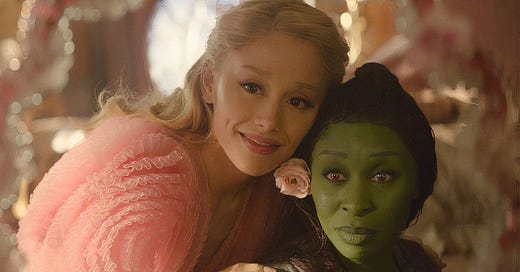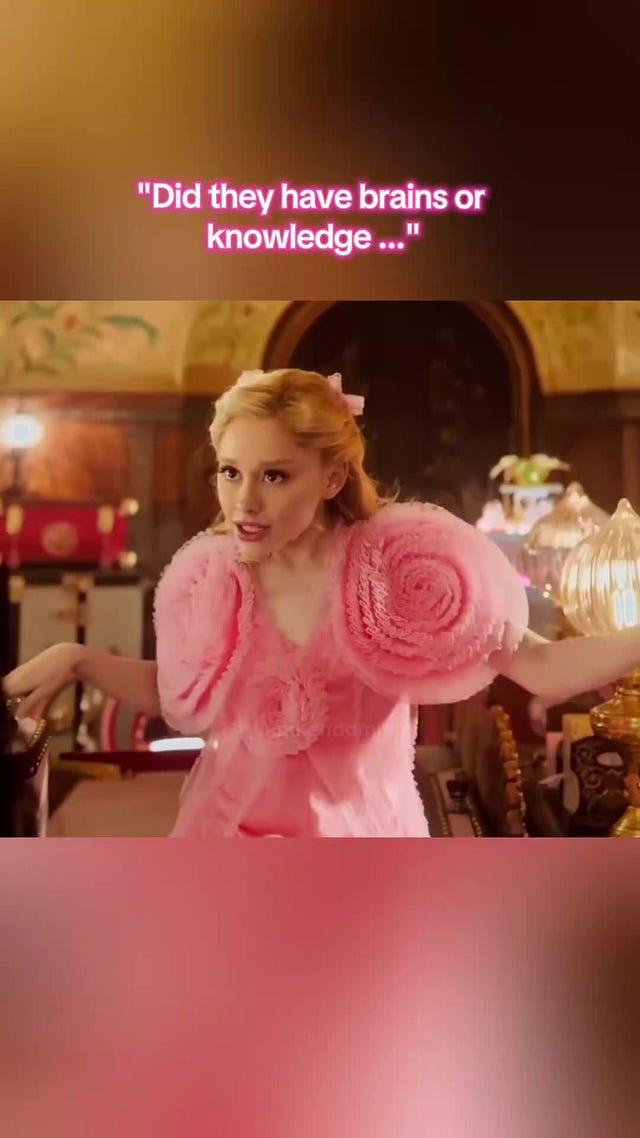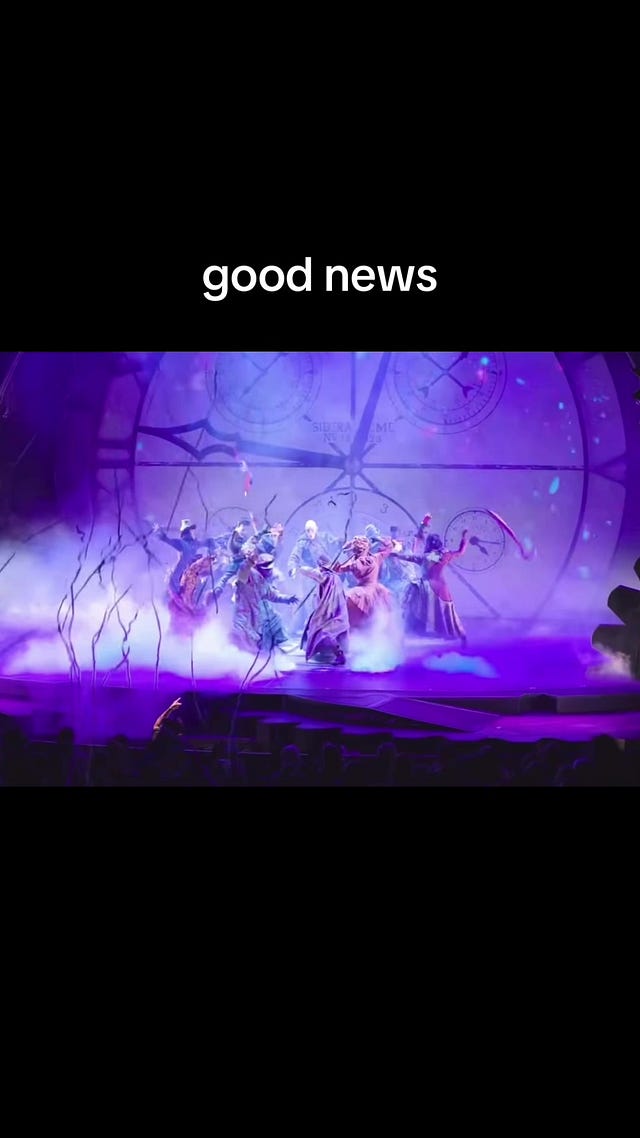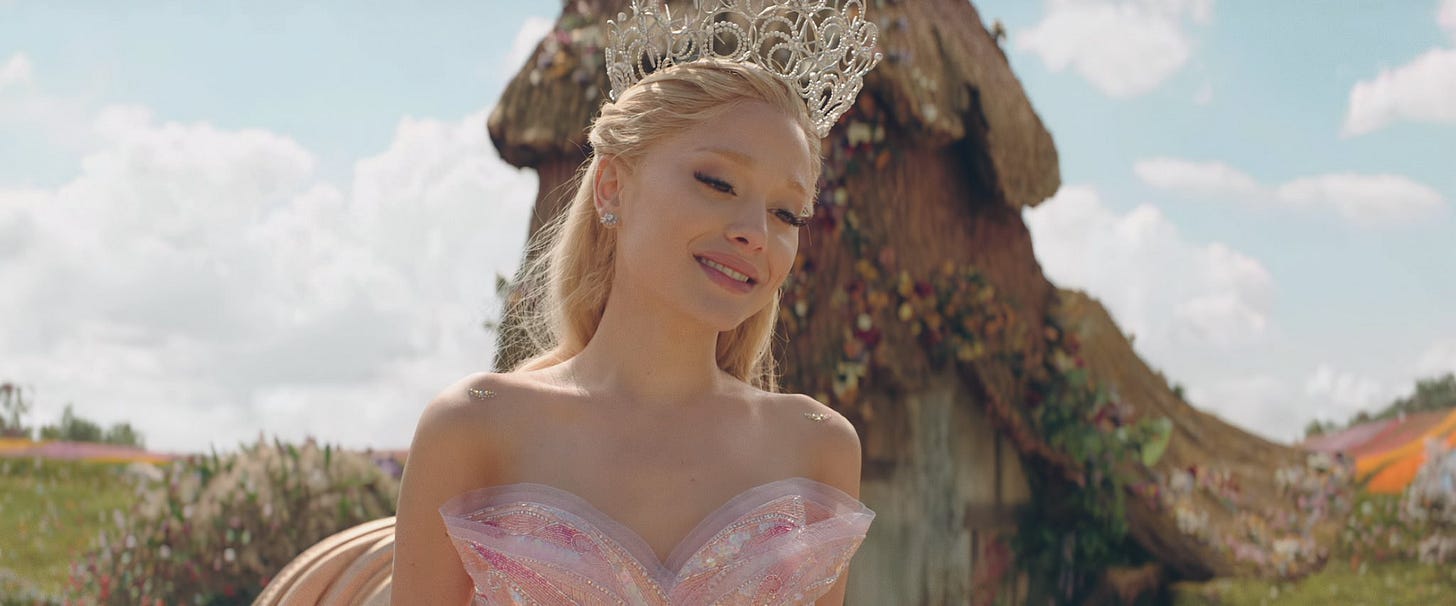If you missed my last post, the tldr is that the release of the movie musical, Wicked, awakened the dormant theater kid in me.
But there’s a piece of Wicked’s poetics I didn’t get a chance to cover in the last one, and it has to do with word choice—specifically the words “good” and “happy.”
Indulge me for a few?
Goodness knows
Perhaps the most central words to the story are “wicked”—its namesake—and its supposed opposite, “good.”
In the original book of the musical, “wicked” gets almost 70 mentions and “good” or “goodness,” over 100.
But a close third? “Happy.” In fact, at several points, the characters are presented with a choice between goodness and happiness: be good and be lonely, or be happy and be popular.
But the story seems to question if the latter is really an option. Can you be happy while lying to yourself? And if you can, then does goodness even matter?
To answer those questions, we need to look at where “happy” and “good” appear.
Happy is what happens
Heart-throb of the movie, Fiyero, starts off as a shallow prince. But we get a glimpse under the surface when he tries (and fails) to defend this position to Elphaba.
After she calls his self-absorption an act, he says, “Excuse me, there's no pretense here. I happen to be genuinely self-absorbed and deeply shallow.”
I love the irony of the phrase “deeply shallow.” But what I love more is her reply.
She says, “No you're not [shallow]. Or you wouldn't be so unhappy.”
This gives us a little insight—not just into his character, but also into his counterpart in shallowness, Glinda. If she, like Fiyero, is putting on a pretense, then she must also be more unhappy than she’s letting on.
We start to see it in the song “Thank Goodness” (coming in part two of the movie). Having made the choice to disown Elphaba in the name of popularity, she sings beside Fiyero,
We couldn't be happier,
Right, dear?
Couldn't be happier,
Right here
Look what we've got
A fairy-tale plot,
Our very own happy ending.
…
Because happy is what happens
When all your dreams come true.
I love that little internal rhyme of “happy is what happens.” It gives the song a fairytale veneer that, combined with the hesitation in her voice, seems painfully oversimplified. The truth is far more complicated.
When Fiyero leaves the stage and she’s left alone singing to the Ozians, the veneer starts to melt away. She sings:
Simply couldn't be happier,
Well, not "simply"
'Cause getting your dreams
It's strange, but it seems
A little, well, complicated.There's a kind of a sort of cost.
There's a couple of things get lost.
There are bridges you cross
You didn't know you crossed
Until you've crossed!
By the end of the song, the Ozians are celebrating her happiness, but we don’t believe her at all.
I hope you’re happy
If this “happy” talk feels reminiscent, it’s probably because “happiness” was the crux of Glinda and Elphaba’s fallout. The song “Defying Gravity” opens in anger, as they both tell each other, sarcastically, “I hope you’re happy [with the choice you’re making].”
By the end of the song, that anger has melted to Glinda’s genuine, heartfelt sendoff: “I hope you’re happy.” She sees Elphaba choosing goodness over happiness—a choice that she, herself, is too afraid to make.
And Glinda isn’t the only one afraid. The wizard himself reveals he’s made a similar choice. When Elphaba tells him she’s happy to meet him, he replies, “Well, that's good. 'Cause that's what I love best: making people happy!” The unspoken: that to do that, he had to become a total sham.
Goodness knows
So if Glinda isn’t really happy, is she at least good? Is Elphaba?
Let’s start with the question that inspired Maguire to write Wicked: are people born wicked, or do they have wickedness thrust upon them by society?
In other words, might “the wicked” sometimes be not wicked, just “unpopular”? For Glinda, the words are practically synonyms. In the song “Popular,” she sings:
Celebrated heads of state
Or specially great communicators!
Did they have brains or knowledge?
Don't make me laugh!They were popular!
Please!
It's all about popular
It's not about aptitude
It's the way you're viewed
 Tiktok failed to load.
Tiktok failed to load.Enable 3rd party cookies or use another browser
The Wizard takes a similar position in what are perhaps my favorite lines of the musical (also coming in the movie, part two):
Is one a crusader
or ruthless invader?
it's all in the label which is able to persist.
There are precious few at ease
with moral ambiguities
so we act as though they don't exist...
(Side note, if you’re sensing some political commentary here, you’re not wrong. Maguire wrote Wicked in 1995 shortly after the Gulf War, and it’s believed to comment on the ways in which propaganda and the labeling of enemies influenced US foreign policy at the time.)
To both Glinda and the wizard, goodness has a lot to do with perception. They don’t distinguish between good and good-looking. At least, Glinda doesn’t in the beginning. But interestingly, her definition seems to get shakier over time…
The wicked’s lives are lonely
The story actually opens toward the end, then flashes backward in time. So the very first lines are:
GOOD NEWS, SHE'S DEAD!
THE WITCH OF THE WEST IS DEAD!
(Side note, here’s a TikTok about the awkwardness of the show opening this way in London on the day the queen died. I laughed way too hard.)
 Tiktok failed to load.
Tiktok failed to load.Enable 3rd party cookies or use another browser
From the very first line, it’s clear there are two camps: the good and the wicked. This scene is dripping with irony when Glinda the “Good Witch”, who we later discover chose her popularity over defense of her friend Elphaba, begins to sing:
Goodness knows, the wicked’s lives are lonely
and goodness knows the wicked die alone.It just shows when you’re wicked,
you’re left only on your own.
She’s presumably speaking of the wicked witch, in a mix of empathy and “I told you so.” But something in her expression indicates she’s also singing about herself—expressing grief and regret over the decision she made. The crowd repeats the refrain back to her dutifully, but with far less sadness in their voices. They seem completely unaware of the irony.
I love that it’s written “goodness knows.” It’s spoken idiomatically, akin to saying “god knows” or “everyone knows.” But it’s also worlds away from “I know.” Because she doesn’t know.
Early Glinda was known for declarations of her own goodness, offering disingenuous gifts “out of the goodness of my heart.” But here, for the first time, she seems unsure if she fits the definition.
Here, “good” and “wicked” are squared up in the same line, but we can’t exactly tell who she’s assigning to each category.
A girl who’s so good inside
This isn’t the case for Elphaba, the “wicked” witch, for whom goodness and wickedness are more clearly defined.
In her song, “The Wizard and I,” we start to get the sense that there’s a difference between goodness and perceived goodness, aka popularity.
Elphaba sings of the Wizard:
And one day he’ll say to me, “Elphaba,
a girl who is so superior,
shouldn’t a girl who’s so good inside
have a matching exterior?”
No good deed goes unpunished
Goodness vs. perceived goodness festers under the surface the whole first act, but in the second act, Elphaba addresses it head-on. In the song “No Good Deed,” she sings:
One question haunts and hurts
Too much, too much to mention
Was I really seeking good
Or just seeking attention?
Is that all good deeds are when looked at with an ice-cold eye?
She seems to be wondering if Glinda is right—if goodness is nothing more than popularity.
For good
Despite her cynicism, the word “good” continues to slip into her speech.
One phrase appears again and again: “for good.” In “One Short Day,” Elphaba says of the wonderful land of Oz, “I’ll be back for good someday.”
Of course we know that colloquially “for good” means “permanently," but couldn’t it also mean “in the name of goodness”?
This subtle duality becomes more pronounced in the second act (coming in part two of the movie), when we get an entire song by the name “For Good”:
Who can say if I’ve been changed for the better,
but because I knew you,
I have been changed for good.
Here, goodness is a declaration. The characters don’t doubt it was present. And we can sense that their goodness has had an effect on one another.
So now I’ll speak carefully here so as not to give any spoilers…
And I’ll say that in the end, we’re still left to wonder who comes out happier—the good, or the popular. But one thing is for certain: goodness does exist in its own right. It’s just far more nuanced—and far less public—than you expect it to be.
Ok I’m done with the Wicked posts for the foreseeable future. But I am a bit nearsighted so ¯\_(ツ)_/¯
If there are no further questions, I’m gonna go.
🐱
Emma















Oh my god. Excellent. Or should I say, GOOD